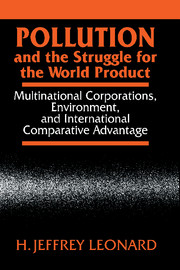 Pollution and the Struggle for the World Product
Pollution and the Struggle for the World Product Published online by Cambridge University Press: 05 January 2012
The examination of international industrial-location trends presented in the last chapter leads to the conclusion that the environment probably has not been and will not become an important factor in determining the distribution of overall international comparative advantage in industrial production, even in the industrial sectors most profoundly affected by stringent environmental controls. There is no evidence that the industrial-flight hypothesis is valid in any but a very narrow range of industries, nor does it appear that the world is being divided into core countries that export industrial polluters and peripheral countries that accept these rejected industries.
Still, the general lack of evidence to support the industrial-flight hypothesis does not necessarily mean that its twin, the pollution-haven hypothesis, is also invalid. The fact that environmental regulations have not driven industries from the United States does not mean that U.S. firms locating abroad have not sought to take advantage of lower environmental standards in some countries and have not contributed to pollution problems arising in countries where they do locate. Nor does it mean that industrializing countries have not operated on the assumption that their overall industrial development will be enhanced by maintenance of lax environmental standards for incoming industries.
This chapter, therefore, evaluates the pollution-haven hypothesis by looking at the extent to which environment has become an important factor in the industrial development of countries outside the United States, Japan, and the most advanced industrial nations of Europe.
To save this book to your Kindle, first ensure [email protected] is added to your Approved Personal Document E-mail List under your Personal Document Settings on the Manage Your Content and Devices page of your Amazon account. Then enter the ‘name’ part of your Kindle email address below. Find out more about saving to your Kindle.
Note you can select to save to either the @free.kindle.com or @kindle.com variations. ‘@free.kindle.com’ emails are free but can only be saved to your device when it is connected to wi-fi. ‘@kindle.com’ emails can be delivered even when you are not connected to wi-fi, but note that service fees apply.
Find out more about the Kindle Personal Document Service.
To save content items to your account, please confirm that you agree to abide by our usage policies. If this is the first time you use this feature, you will be asked to authorise Cambridge Core to connect with your account. Find out more about saving content to Dropbox.
To save content items to your account, please confirm that you agree to abide by our usage policies. If this is the first time you use this feature, you will be asked to authorise Cambridge Core to connect with your account. Find out more about saving content to Google Drive.